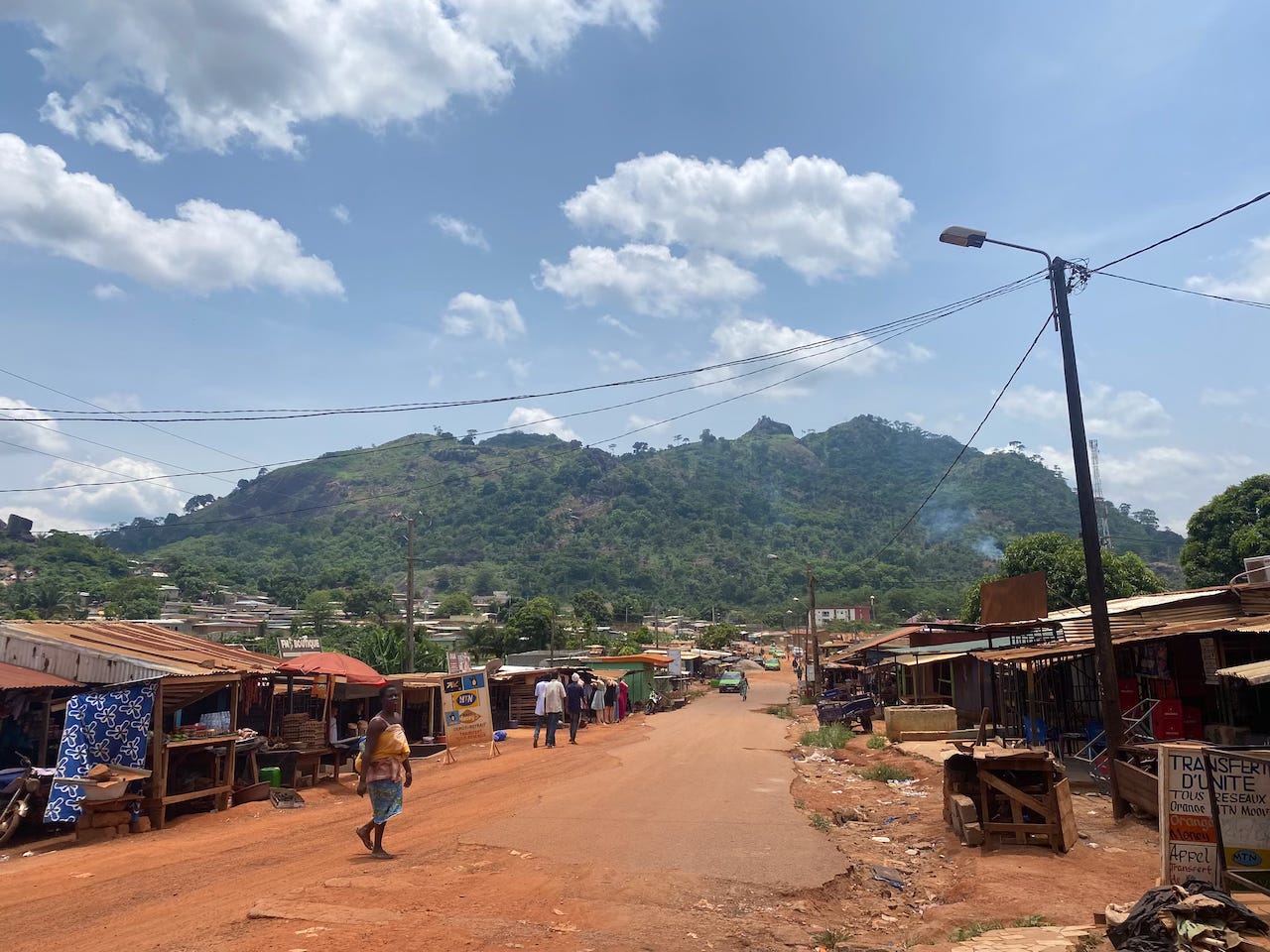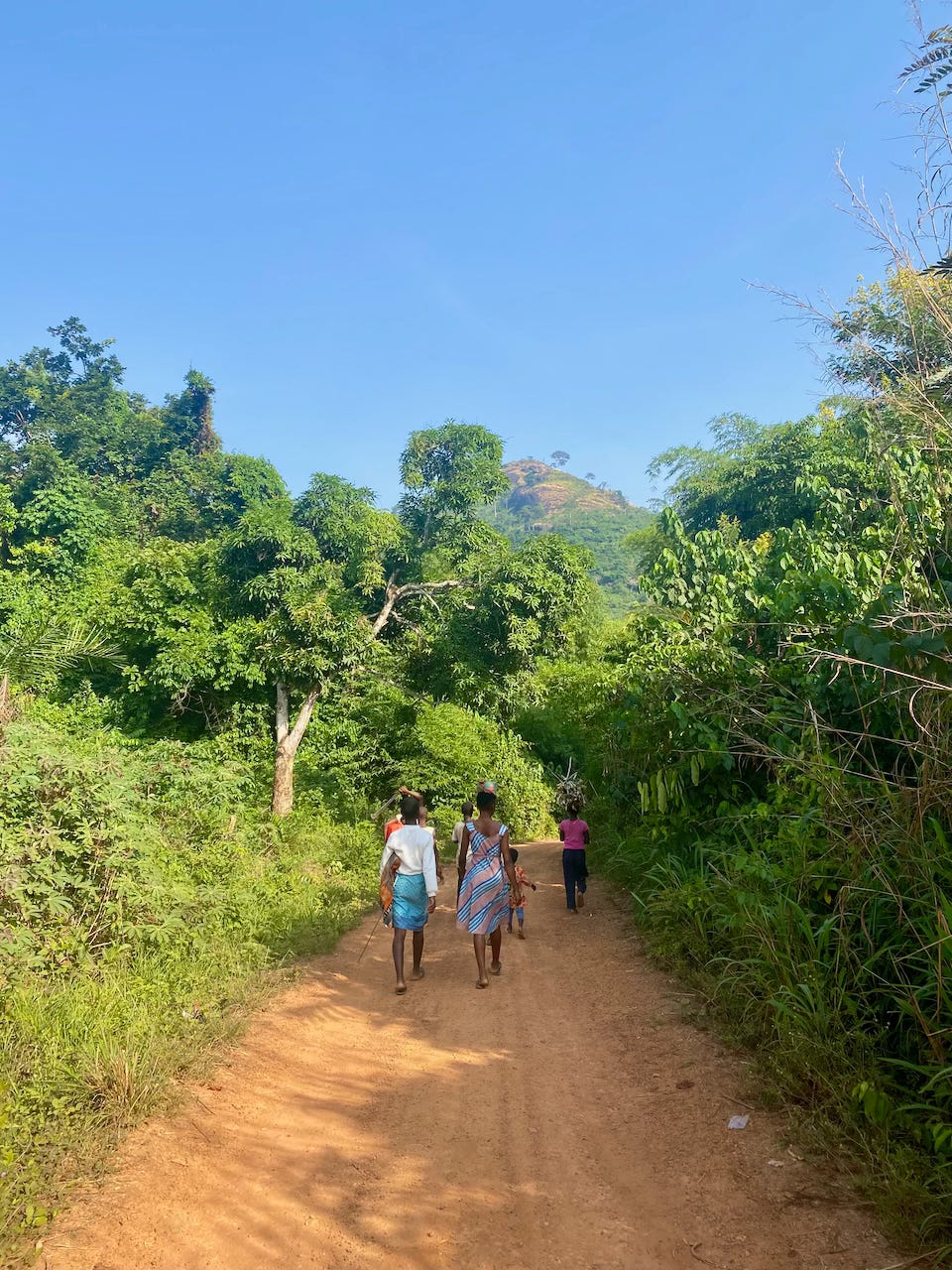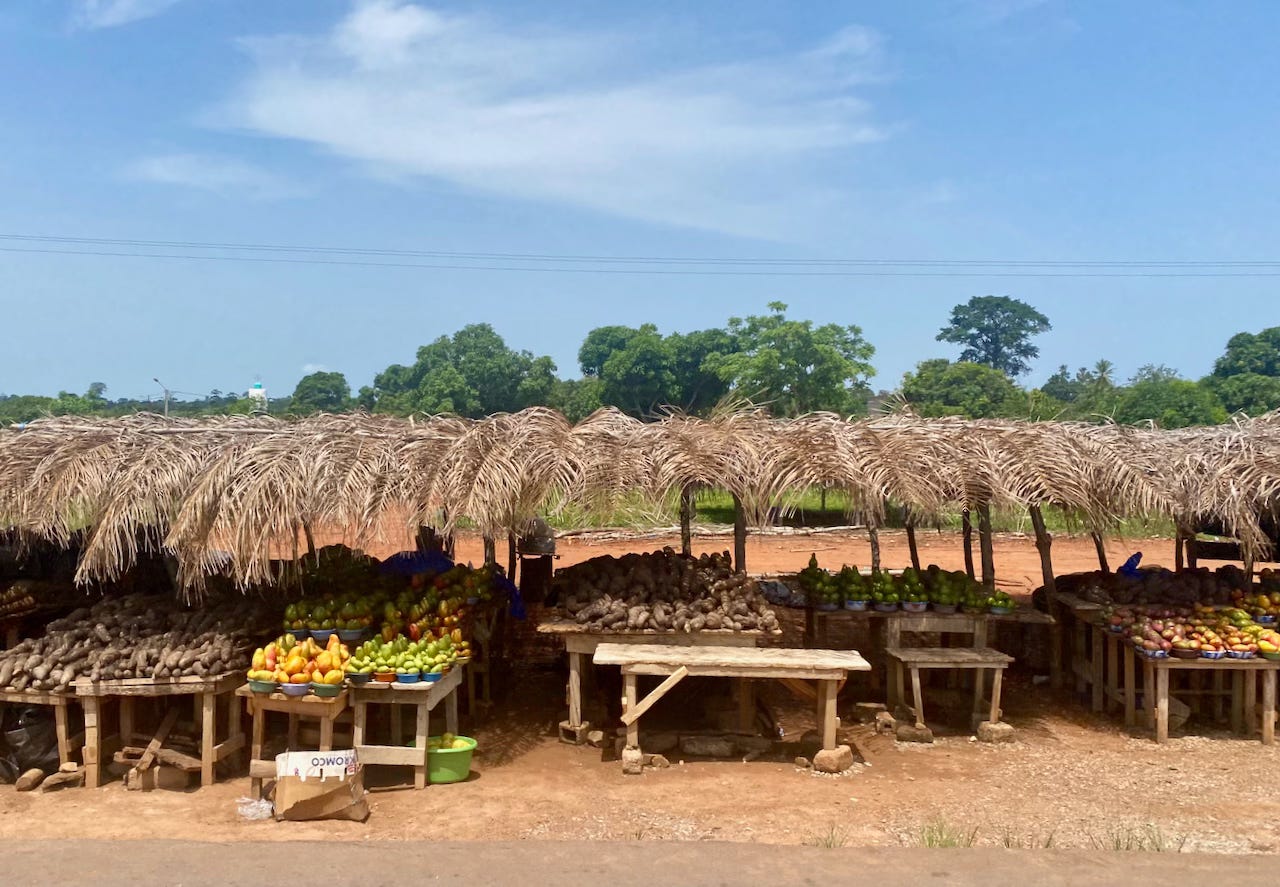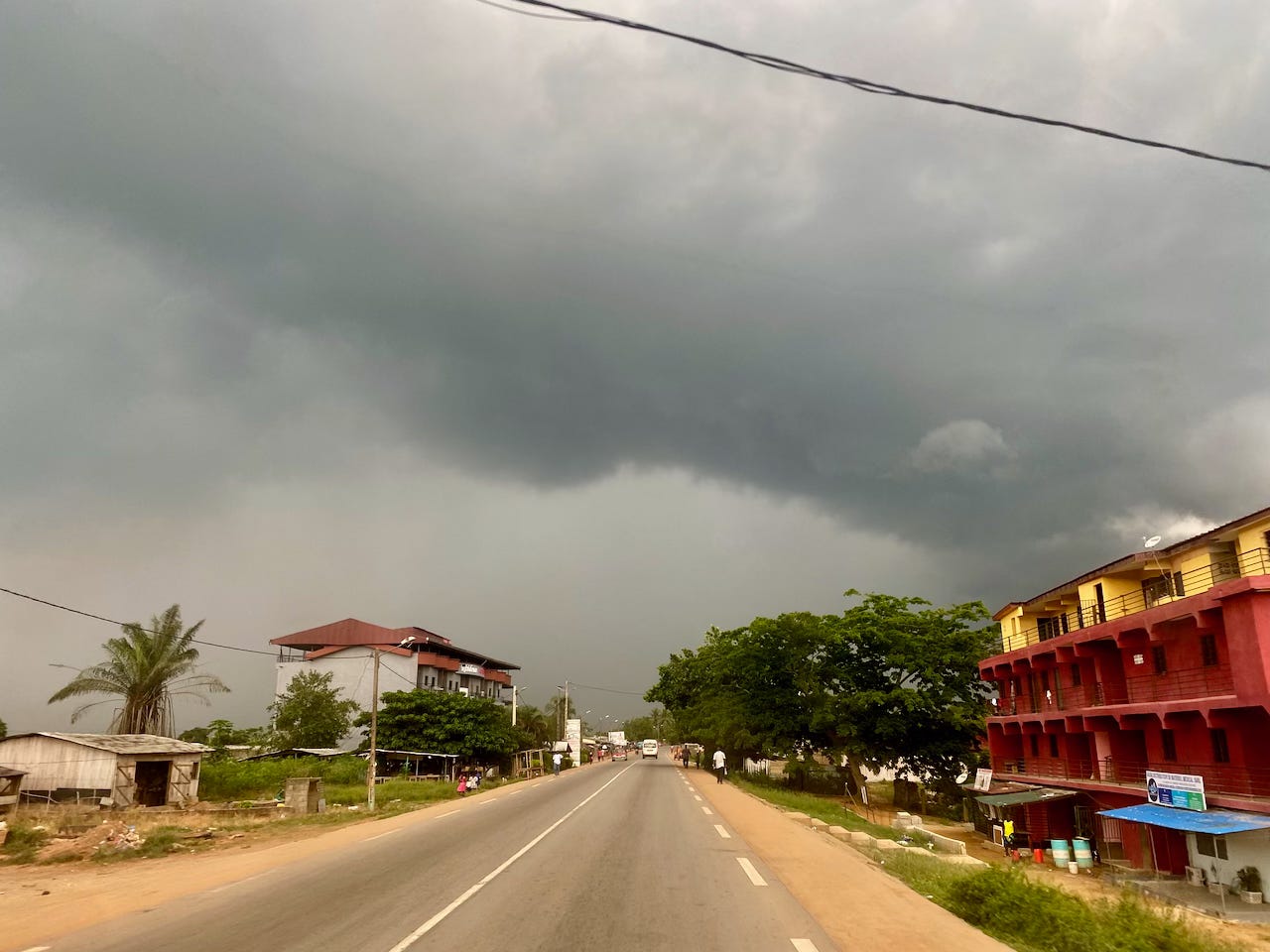IVORY COAST / CÔTE D’IVOIRE
A bit of a catch-up is needed. As I start to write this we’re waiting for a ferry from France to the UK, having left our studio apartment in Belgium a few hours ago. It seems we never really want to get off the merry-go-round of logistics, packing, sorting, leaving, arriving. But the current context couldn’t feel more different to the last nine months.
We’re on quite a long pause in our Africa journey now. Ivy is stored in Ghana, sitting out the rainy season over the summer and quite possibly cultivating brand new species of mould in the intense humidity, while we catch up with lots of people and lots of things here. But more of that later.
Here’s the journey so far - around 22 million seconds of travelling, boiled down to 20.
I’m hauling my mind back to a place that already seems like a distant dream. I’ve been flicking through my notes from Ivory Coast – a small paper diary that contains a few memory-jogging words from each day and a record of where we have slept each night. If I was to do a word cloud of those weeks, ‘HOT’ and ‘SWEATY’ would dominate. To help my foggy brain, in this post I’ll rely on a few direct quotes from the diary.
It was a long, boiling hot day when we crossed the border from Liberia into Ivory Coast, ‘driving some really shit sections of road’ and going through a ‘drawn out border process with some ridiculous bureaucracy and people sleeping in their offices’. It’s not as unusual as you might think to be dealing with a serious-faced customs or immigration officer while one of their colleagues is stretched out on some chairs right next to us, having a massive drooly nap.
I did the paperwork, while Jeremy went off to spend the last of our Liberian cash on some street food for dinner later – attiéké (grated fermented cassava that’s steamed into a couscous-like texture), cassava leaf sauce, and some grilled goat meat.
People were doing a roaring trade in piles of animal skins and canisters of fuel at the border. We squeezed through the narrow piece of road left by the encroaching market stalls and carried on with the terrible roads for a while.
This lorry got stuck trying to get up the hill and we only just managed to inch past. Someone was coming to assist them, they said, and we gave them some water to help them through the wait.
Quite soon into our journey towards the city of Man, the road turned to beautiful tarmac which helped us on our way. Before arriving, we pulled into a small roadside town and had a ‘kafkaesque experience’ trying to buy SIM cards from a grunty, monosyllabic man. Getting internet for our phones is an often tedious chore that has to be completed after every border, and each country’s set-up is usually just different enough to cause confusion. It was a tactical error to go SIM hunting at the end of a long, hot day. ‘Jeremy nearly had a stroke’, I wrote.
We arrived in Man at dusk, soaked in sweat and knackered, and headed for a Catholic social and medical complex on the outskirts, run by the Focolare Movement, which offers space to campers. Its beautiful gardens, friendly atmosphere, shade and running water provided just the haven we needed. We parked up and grabbed a cold beer from the fridge just as a religious procession cranked up and paraded past. It’s not the first time we’ve been welcomed by the religious community while overlanding. As a couple of atheists, these experiences force us to contemplate our hypocrisy but, like true hypocrites, we quickly get over it – needs must! :)
It was spectacularly humid. We staggered through a shadeless walk into town on day one and marvelled at how different things seemed compared with the previous few countries. I’ve even remarked on the presence of pavements: ‘First town we’ve visited in a while that feels more ‘normal’. Some pavements. Bars and cafes en route, small supermarkets. Lively. Shopped and had an ice cream! Great market, best selection of veg seen for a while. Very little bother from people’.
Ivory Coast, the world’s largest producer of cocoa beans, has been bucking the trend for a while with its strongly growing economy and relatively high investment levels.
It was immediately noticeable to us that – while the country still faces poverty and inequality – more people seemed to have the disposable income to go out and socialise. You really notice it when that’s not there and when it is, it significantly changes the atmosphere of a place.
Near the camping place there was a strip of ‘maquis’ – rustic open-air bars serving simple food. We had a night out, surrounded by locals also enjoying some beers and barbequed meat and fish. The rain hammered down while we ate. Rainy season was gradually approaching.
The Man area is mountainous so there are opportunities for walking, although the heat made it tricky to do really long hikes. We scrambled up one nearby hill to get some nice views, passing through a village as their Sunday morning church service was in full swing.
We couldn’t pass up the slightly touristy opportunity to see some monkeys up close. A small forest in the city is considered as sacred and is home to a community of cute Campbell’s Mona monkeys. Legend says that these were originally human residents of the city who were turned into monkeys to protect them from a marauding emperor. Considered as equal citizens, they are fed by the locals and no outsiders are allowed to enter the forest.
We stood at the edge of the trees, feeding them chunks of banana and generally being outwitted.





We did tackle one hilly hike, a lovely route through several villages towards Mont Tonkpi. We left super early to avoid the worst of the heat but still had to curtail it due to the lack of shade: ‘It was ROASTING’.






While staying in Man we were lucky to encounter Fabien, a French guy who’s married to an Ivorian. He encouraged us to go along to a traditional mask festival in a nearby village, which was one of most memorable and special experiences of our trip – I’ve already written about it in a previous post, here.
After the festival we called back into the Focolari centre for a few hours and asked to pay a fee to shower, fill our water tank, and empty our toilet. I can’t emphasise strongly enough how much of a saviour such places are in countries where decent camping facilities are rare. We left feeling refreshed, had our cooking gas tank refilled at a car wash at the edge of the town and drove towards Abidjan.
After a gloriously peaceful night in the bush, we hit the posh highway and saw our first sight in ages of a really modern city, Yamoussoukro, which has been Ivory Coast’s political capital since 1983. Home to the world’s largest basilica, we did the city zero justice by just whizzing past, snapping a photo of the towering cupola as we headed for the south.
Showing our truly godless leanings, as we came around the city we were slightly more excited to spot an Aucun supermarket and to find a petrol station with coffee and pastries. The staff were dancing to music inside; definitely a more joyous vibe than your average Shell station.
With a bit of persuasion, the police allowed us to sleep at a motorway toll point that night so we could avoid driving into Abidjan until the morning. We had a quick overnight in the city to apply for our Ghana visa at the embassy.

While waiting for the visa to be ready, we headed out east to the coast. It had been a while since Ivy had done some 4x4 sand driving, which was helpful for this track through a forest of palm trees that led to our excellent sleeping spot.
From our spot, we watched the locals pulling in their fishing nets, calling out the rhythm as they did so.
It was an odd couple of nights though – Jeremy developed a fever and high temperature and we were concerned about malaria. We were alone there except for the security guard and there were no clinics for miles. Although our home test was showing negative, he started taking malaria meds just in case and was feeling a lot better by the day we left. We also had a big rainstorm and had our first afternoon of loafing with a movie in months.
Then it was back to Abidjan. Here’s our speeded-up route out through the villages and palm forest.
Camping in the city is not feasible. We spend another couple of nights in a hotel so we could collect our Ghana visa, make a (fruitless) visit to a 4x4 mechanic, and enjoy some more city life.


The city traffic was awful; we inched along in the searing heat. En route back from the mechanic we were hit with our first police fine after driving the wrong way up a one-way street. After we passed the ambiguously-placed no-entry sign the police were waiting right there with their whistles – it was a clever little trap, but we fell right into it and didn’t have a leg to stand on. They said we could pay the 22,500CFA (€34) fine on the spot – or we could let them hold our documents, drive to the courthouse to pay the fine and then retrieve our papers later from a police station elsewhere. There was no way we were going to spend the whole day chasing round the city doing that. ‘It was all set up so they could get the cash in hand. We felt we had no choice but to pay’.
Very annoying, but we moved on and treated ourselves to a fabulous posh Lebanese lunch near the Ghanaian embassy, and collected our visas - yay!
That evening we had an actual proper late night out, at the city’s famous Parker Place reggae club. Again, we enjoyed the novelty of being around crowds of people out socialising.
There’s so much to Ivory Coast and although we’d packed in a fair amount, we felt we’d only scratched the surface of this large country. But we had a deadline to work towards – to get to Ghana and do some stuff before preparing Ivy for storage, then flying out from there to the UK/Belgium for this pause.
On our final day in the country we drove past miles and miles of huge palm oil plantations as we headed for the border. Piles of yams, avocados and pineapples lined the road. There was a massive rainstorm and we had to keep pulling over because visibility was so poor. After our accident and the subsequent repairs, Ivy was still managing to stay dry inside despite the deluges. We’d decided to sleep at the border and cross over in the morning. The frontier area was jammed with trucks trying to pass each other and it was chaotic, rainy and getting dark. ‘J had a huge shouting match with a trucker who kept telling us to reverse out of the queue’. I’ve never heard Jeremy yelling in French; it sounded quite strange.
We finally got out of there and parked by a local health clinic for the night. ‘It was so wet, for the first time we didn’t even open the door all evening’.
There must have been a pond nearby and the noise from a crowd of croaking frogs was deafening. My last note from Ivory Coast read: ‘Frog chorus. No sleep’.
As early-to-bed campers, a night out at a club followed by an all-night frog band is almost too much for us to cope with these days. Luckily we were heading straight to the beach in Ghana for a little spell of peace and quiet.




































Jeremy yelling in French does sound like fun. Which makes one wonder, in how many languages can you two curse someone out? :-)
Love reading about all your adventures Paula. And you write them so well xxx